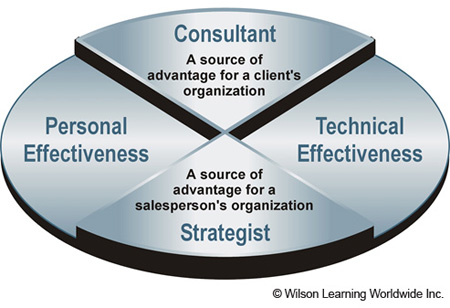Balancing the Consultant and Strategist Roles
Managing the 4 Sides of Sales is Key to Highly Effective Selling Skills

There was a time when a salesperson could fulfill a unified role as a vendor, trusted advisor, and challenger. But today's hypercompetitive market requires the salesperson to play two distinct yet complementary roles—that of Consultant to the customer and Strategist to both the customer and his or her own organization.
We all know salespeople who are strong Consultants but weak Strategists. Strong sales Consultants bring valuable expertise to their accounts, but they rarely close the big deal; and if they do, all the value-added services they promise make it an unprofitable sale.
In contrast, salespeople who are all Strategist and no Consultant can tell you the precise dollar value and margin of every opportunity and can outmaneuver the competition, even when it is not in the best interest of the customer. The result is they win a lot of deals but often only once, and they damage relationships both inside and outside the organization.
Building on the foundational skills of Personal Effectiveness and Technical Effectiveness, successful salespeople today must also develop both Consultant and Strategist skill areas. This balancing act is critical if salespeople hope to be competitive and serve their clients.
PERSONAL AND TECHNICAL EFFECTIVENESS
Before developing the roles of Consultant and Strategist, successful salespeople must tap into their Personal Effectiveness to handle stress, assess risks, manage conflict, and generate creative solutions. Their success is dependent on their ability to develop relationships, deal with complexity and ambiguity, and provide leadership in the diverse universe of globalization and multinational talent.
At the same time, Technical Effectiveness is the lifeblood of the highly effective salesperson. To sit down and speak credibly with a CFO or CEO, salespeople need much more than just product-specific knowledge; they need a range of strategic and business acumen, including knowledge about applications, business processes, financial conditions, and other functional factors that affect the purchase, use, and integration of products and services.
SALESPERSON AS BUSINESS CONSULTANT

The Consultant role serves as a source of competitive advantage to the customer. A Consultant facilitates an organizational response to solve customers' business problems. Key Consultant skills include:
- Discovering the Customer's Critical Success Factors: Consultants understand the business priorities of the customer's executives—those things that keep the CEO, CFO, and CIO awake at night. The ability to discover and show executives how your solution helps them meet their most critical success factors (CSFs) can link your offering to the core of the customer's business.
- Aligning with the Customer's Buying Behaviors: Consultants understand the buying process and recognize whether the customer is seeking a strategic partnership or a more transactional relationship. Many times, the customer does not need or want a business partner. The effective Consultant knows that sometimes customers need their assumptions challenged, while in other cases they are clear and accurate about their requirements.
- Creating a Differentiated Offering: When the client asks for only specs and price, a Consultant can find something more that the client would value enough to pay for. This "something extra" is usually not in the product itself, but in how the customer uses it. The ability to see an offering from the customer's point of view in both technical and business terms can pay off as a valuable differentiator.
- Improving the Customer's Business Processes: Consultants recognize that customers are not just buyers and users of products; they are a production system that creates value for their customers. Consultants understand the value chain and offer products and services that provide unexpected value. This makes the customer's life easier and their business more competitive.
SALESPERSON AS STRATEGIST
The other role required of the successful salesperson is that of a Strategist to his or her own organization. Key Strategist skills include:
- Managing Opportunities: Successful Strategists know how to qualify accounts in a rigorous and objective manner, assess whether a customer has a need and a budget, and determine if the product specifications and technical requirements fit. They see the relative strength of other opportunities, the level of influence given a complex decision, and the organizational compatibility between their own company and the customer's business. This provides a framework for making decisions about allocating resources and forecasting sales and profitability.
- Managing Decisions: The Strategist understands and influences the dynamics of the customer's decision-making process. Instead of focusing on the key decision maker to influence, the Strategist maps the decision-making process, identifies the stakeholders and their specific needs, and develops effective and appropriate ways to influence key decision team members and leverage supporters and internal champions.
- Managing Competition: The Strategist knows the customer's definition of value and where he or she stands against the competition, thereby avoiding the risks of provoking or engaging in a competitive battle in sight of the customer. The Strategist can identify and execute the best competitive strategy based on the specific conditions of a given opportunity.
- Managing the Message: Strategists know that messaging occurs throughout the sales process—not just in a single presentation, but delivered through champions in the customer organization. Buying today often involves multiple stakeholders in the decision process; the ability to craft tailored messages, gain support for communicating those messages, and follow up on their impact is a key to success.
THE KEY IS BALANCE
The roles of Consultant and Strategist are not contradictory. They represent the yin and yang of sales effectiveness.
Senior buying executives uniformly say that the most valued suppliers are those who demonstrate both the Consultant and Strategist roles—who will push back on assumptions, who are willing to walk away rather than sell them the wrong solution, and who bring value every time they engage with the customer.
To learn more, contact Wilson Learning at 1.800.328.7937 or complete the online form.







 Please complete this form to download Balancing the Consultant and Strategist Roles | Managing the 4 Sides of Sales is Key to Highly Effective Selling Skills.
Please complete this form to download Balancing the Consultant and Strategist Roles | Managing the 4 Sides of Sales is Key to Highly Effective Selling Skills.



